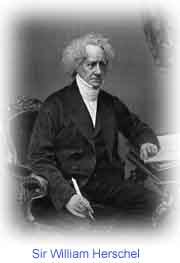
|

|

By Herb Geduld
DECADES BEFORE Judaism's Reform movement anguished over the dilemma of patrilineal descent, the editors of the English-language Jewish encyclopedias solved the problem in a pragmatic way. Any descendant of a Jewish father and a Christian mother who amounted to anything was included in their works, whether or not he or she was a practicing Jew.
Among the many who have achieved this honor, were Sir William Herschel and his sister, Caroline, an early odd couple in the history of science.
Fredrich Wilhelm Herschel -- he later anglicized his name -- was born in Hanover, Germany in 1738. His grandfather, Abraham, was an active member of the tiny Jewish community, but his father, Isaac, an oboist in the Hanover Guards military band, had assimilated and married a Christian woman, Anna Moritzen. William, his sister, Caroline, and his brother, Jacob, were brought up as musicians, but their father also passed on his intense cultural and scientific curiosity to his children.
In 1757, the family moved to England, where William became the chief organist of a chapel in the resort town of Bath. To improve his musicianship, he started to study the laws of harmony and mathematics. This led him to optics, and from there, to astronomy.
By the time Herschel was 40, astronomy had become his obsession. He not only spent every clear English night gazing at the heavens, but he spent most of his days constructing his own telescope. He turned his staid English manor home into an ametur telescope factory and cast metal telescope mirrors in the kitchen.
Sister and helpmate
His faithful sister and housekeeper, Caroline, got caught up in Wilhelm's passion. She even spoon-fed him his dinner on viewing nights when he was so absorbed in charting the heavens that he didn't take time off to eat.
Herschel systematically surveyed the skies and initially calculated every star of the 4th Magnitude or brighter, an awesome task. It was during this intense survey that, in 1751, he discovered what he thought was either a new comet or a planet. Since the dawn of recorded history, the world had known of only the seven visible planets, and astronomers did not even suspect the existence of any planets beyond Saturn.
Within six months of Herschel's discovery, other astronomers had confirmed his sighting. It was definitely established that the heavenly body in question was a planet, not a comet, and they began searching for a name for this major new celestial object. Herschel, who was interested in retaining a subsidy from the British Royal Family, suggested that the planet be called Georginian Sidus, George's Star, after the reigning King George III; it was known as the Georgian Planet in England for about 60 years.
Jewish, briefly
In France, where the astronomers had no love for the English, they called the planet "Herschel," and for about 20 years we had a nice celestial sphere with a Jewish name in the heavens.
It was not to last.
In Germany, the editor of the astronomical yearbook suggested that, in keeping with the mythological names of the other planets, it be called Uranus after the Greek god of the sky. After 1851, this name became universally accepted.
Six years after he discovered Uranus, Herschel found two moons surrounding the planet, which his astronomer son, John, named Oberon and Titania, after characters in Shakespeare's Midsummer Night's Dream.
Eventually, 15 moons and nine rings were discovered around Uranus. Ten of the moons were found only in the past decade, during a fly-by of Voyager II, after an 8-1/2year sojourn in space. None of these were named for Herschel, but if you look up at the full moon, right smack dab in the middle is a little rinky-dink crater named Herschel. A pretty big letdown after a
4/98: We nearly had a planet named 'Herschel'
3/98: FLASH! How two nice Jewish musicians created color film
2/16/98: Isachar Zacharie, Presidential Corn-cutter and confidant
2/3/98: When Monticello had a mezuzah